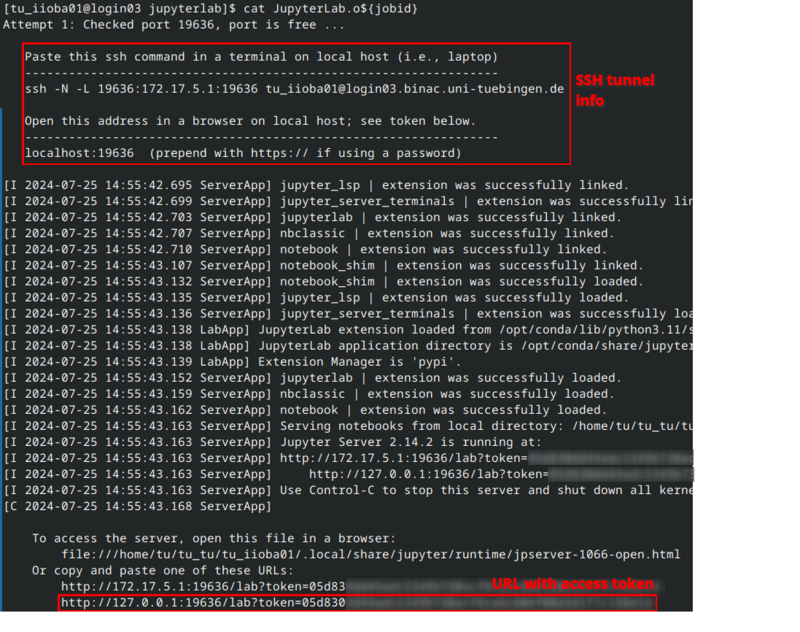BinAC/Software/Jupyterlab: Difference between revisions
F Bartusch (talk | contribs) No edit summary |
F Bartusch (talk | contribs) No edit summary |
||
| Line 9: | Line 9: | ||
|- |
|- |
||
| License |
| License |
||
| [https://github.com/jupyterlab/jupyterlab/blob/main/LICENSE |
| [https://github.com/jupyterlab/jupyterlab/blob/main/LICENSE JupyterLab License] |
||
|- |
|- |
||
| Links |
| Links |
||
| Line 26: | Line 26: | ||
== Start Jupyterlab == |
== Start Jupyterlab == |
||
The module provides a |
The module provides a job script for starting a JupyterLab instance on the BinAC <code>inter</code> queue. |
||
Load the module and copy the |
Load the module and copy the job script into your workspace: |
||
<pre> |
<pre> |
||
| Line 34: | Line 34: | ||
</pre> |
</pre> |
||
You can adjust the following settings in the |
You can adjust the following settings in the job script according to your needs. |
||
<pre> |
<pre> |
||
| Line 53: | Line 53: | ||
</pre> |
</pre> |
||
== |
== Create SSH tunnel == |
||
The information you need to access Jupyterlab is printed in the job's standard output file. |
The information you need to access Jupyterlab is printed in the job's standard output file. |
||
| Line 63: | Line 63: | ||
</pre> |
</pre> |
||
| ⚫ | |||
=== Linux Users === |
|||
| ⚫ | |||
| ⚫ | |||
| ⚫ | |||
The ssh command creates an SSH tunnel through which you can access Jupyterlab in your browser. |
The ssh command creates an SSH tunnel through which you can access Jupyterlab in your browser. |
||
The ssh command does not return a result. If there is no error message everything should be fine. |
The ssh command does not return a result. If there is no error message everything should be fine. |
||
=== Windows Users === |
|||
== Access JupyterLab == |
|||
The Jupyterlab output file also contains a direct link to your Jupyterlab: |
The Jupyterlab output file also contains a direct link to your Jupyterlab: |
||
Revision as of 16:32, 25 July 2024
|
The main documentation is available on the cluster via |
| Description | Content |
|---|---|
| module load | devel/jupyterlab |
| License | JupyterLab License |
| Links | Homepage |
| Graphical Interface | Yes |
Description
JupyterLab is a web-based interactive development environment for notebooks, code, and data.
Usage
Start Jupyterlab
The module provides a job script for starting a JupyterLab instance on the BinAC inter queue.
Load the module and copy the job script into your workspace:
module load devel/jupyterlab/7.2.1 cp $JUPYTERLAB_EXA_DIR/jupyterlab.pbs.template jupyterlab.pbs
You can adjust the following settings in the job script according to your needs.
#PBS -l nodes=1:ppn=1 # adjust the number of cpu cores (ppn) #PBS -l mem=2gb #PBS -l walltime=6:00:00
Please note the restrictions of the inter queue:
- max. walltime: 12 hours
- max. cores: 28
- max jobs per user: 1
Then submit the job.
jobid=$(qsub jupyterlab.pbs)
Create SSH tunnel
The information you need to access Jupyterlab is printed in the job's standard output file.
This file is named Jupyterlab.<jobid> and the following command will print the connection details:
Please note that details like IP, port number, and access URL will vary.
cat JupyterLab.o${jobid}
Linux Users
If you are using Linux, copy the ssh command and execute it on your local machine and authenticate yourself with second factor and password. The ssh command creates an SSH tunnel through which you can access Jupyterlab in your browser. The ssh command does not return a result. If there is no error message everything should be fine.
Windows Users
Access JupyterLab
The Jupyterlab output file also contains a direct link to your Jupyterlab:
cat JupyterLab.o11604591 [...] Or copy and paste one of these URLs: [...] http://127.0.0.1:18617/lab?token=<your token>
Stop Jupyterlab
Add new Kernels
== Set
